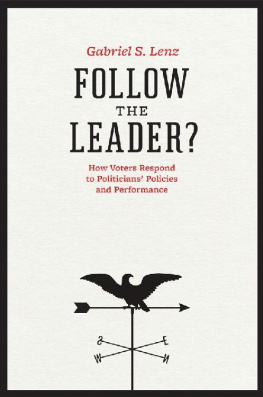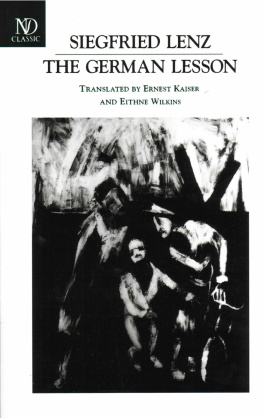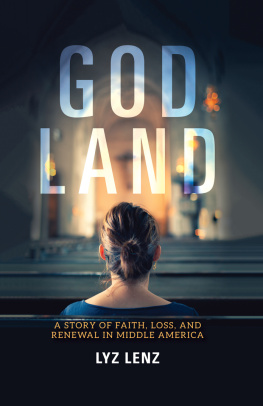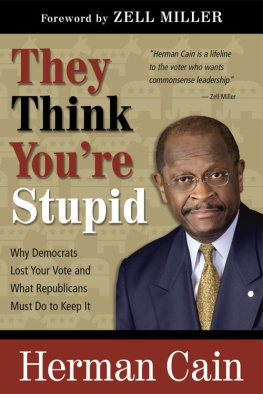Lenz - Follow the Leader? How Voters Respond to Politicians’ Policies and Performance
Here you can read online Lenz - Follow the Leader? How Voters Respond to Politicians’ Policies and Performance full text of the book (entire story) in english for free. Download pdf and epub, get meaning, cover and reviews about this ebook. City: Chicago, Ill., Förenta staterna, Array, year: 2012, publisher: University of Chicago Press, genre: Politics. Description of the work, (preface) as well as reviews are available. Best literature library LitArk.com created for fans of good reading and offers a wide selection of genres:
Romance novel
Science fiction
Adventure
Detective
Science
History
Home and family
Prose
Art
Politics
Computer
Non-fiction
Religion
Business
Children
Humor
Choose a favorite category and find really read worthwhile books. Enjoy immersion in the world of imagination, feel the emotions of the characters or learn something new for yourself, make an fascinating discovery.
Follow the Leader? How Voters Respond to Politicians’ Policies and Performance: summary, description and annotation
We offer to read an annotation, description, summary or preface (depends on what the author of the book "Follow the Leader? How Voters Respond to Politicians’ Policies and Performance" wrote himself). If you haven't found the necessary information about the book — write in the comments, we will try to find it.
Lenz: author's other books
Who wrote Follow the Leader? How Voters Respond to Politicians’ Policies and Performance? Find out the surname, the name of the author of the book and a list of all author's works by series.
Follow the Leader? How Voters Respond to Politicians’ Policies and Performance — read online for free the complete book (whole text) full work
Below is the text of the book, divided by pages. System saving the place of the last page read, allows you to conveniently read the book "Follow the Leader? How Voters Respond to Politicians’ Policies and Performance" online for free, without having to search again every time where you left off. Put a bookmark, and you can go to the page where you finished reading at any time.
Font size:
Interval:
Bookmark:
GABRIEL S. LENZ is assistant professor in the Charles and Louise Travers
Department of Political Science at the University of California, Berkeley.
The University of Chicago Press, Chicago 60637
The University of Chicago Press, Ltd., London
2012 by The University of Chicago
All rights reserved. Published 2012.
Printed in the United States of America
21 20 19 18 17 16 15 14 13 12 1 2 3 4 5
ISBN-13: 978-0-226-47213-3 (cloth)
ISBN-13: 978-0-226-47214-0 (paper)
ISBN-13: 978-0-226-47215-7 (e-book)
ISBN-10: 0-226-47213-2 (cloth)
ISBN-10: 0-226-47214-0 (paper)
ISBN-10: 0-226-47215-9 (e-book)
Library of Congress Cataloging-in-Publication Data
Lenz, Gabriel S., 1975
Follow the leader? : how voters respond to politicians policies and performance / Gabriel S. Lenz.
pages cm.(Chicago studies in American politics)
ISBN 978-0-226-47213-3 (cloth : alkaline paper)ISBN 0-226-47213-2 (cloth : alkaline PAPER)ISBN 978-0-226-47214-0 (paperback : alkaline PAPER)ISBN 0-226-47214-0 (paperback: alkaline PAPER)ISBN 978-0-226-47215-7 (E-BOOK)ISBN 0-226-47215-9 (e-book) 1. VotingUnited States. 2. ElectionsUnited States. 3. United StatesPolitics and goverment. I. Title. II. Series: Chicago studies in American politics.
JK1965.L459 2012
324.973dc23
2012002384
 This paper meets the requirements of ANSI/NISO Z39.48-1992 (Permanence of Paper).
This paper meets the requirements of ANSI/NISO Z39.48-1992 (Permanence of Paper).
Follow the Leader?
How Voters Respond to Politicians Policies and Performance
GABRIEL S. LENZ
THE UNIVERSITY OF CHICAGO PRESS
CHICAGO AND LONDON
Chicago Studies in American Politics
A series edited by Benjamin I. Page, Susan Herbst,
Lawrence R. Jacobs, and James Druckman
Also in the series:
THE SUBMERGED STATE: HOW INVISIBLE GOVERNMENT POLICIES UNDERMINE AMERICAN DEMOCRACY by Suzanne Mettler
DISCIPLINING THE POOR: NEOLIBERAL PATERNALISM AND THE PERSISTENT POWER OF RACE by Joe Soss, Richard C. Fording, and Sanford F. Schram
WHY PARTIES? A SECOND LOOK by John H. Aldrich
NEWS THAT MATTERS: TELEVISION AND AMERICAN OPINION, UPDATED EDITION by Shanto Iyengar and Donald R. Kinder
SELLING FEAR: COUNTERTERRORISM, THE MEDIA, AND PUBLIC OPINION by Brigitte L. Nacos, Yaeli Bloch-Elkon, and Robert Y. Shapiro
OBAMAS RACE: THE 2008 ELECTION AND THE DREAM OF A POST-RACIAL AMERICA by Michael Tesler and David O. Sears
FILIBUSTERING: A POLITICAL HISTORY OF OBSTRUCTION IN THE HOUSE AND SENATE by Gregory Koger
IN TIME OF WAR: UNDERSTANDING AMERICAN PUBLIC OPINION FROM WORLD WAR II TO iraq by Adam J. Berinisky
US AGAINST THEM: ETHNOCENTRIC FOUNDATIONS OF AMERICAN OPINION by Donald R. Kinder and Cindy D. Kam
THE PARTISAN SORT: HOW LIBERALS BECAME DEMOCRATS AND CONSERVATIVES BECAME REPUBLICANS by Matthew Levendusky
DEMOCRACY AT RISK: HOW TERRORIST THREATS AFFECT THE PUBLIC by Jennifer L. Merolla and Elizabeth J. Zechmeister
AGENDAS AND INSTABILITY IN AMERICAN POLITICS, SECOND EDITION by Frank R. Baumgartner and Bryan D. Jones
Contents
Acknowledgments
This book began as a PhD dissertation in the Politics Department at Princeton University. I had the good fortune to be advised by Larry Bartels, Tali Mendelberg, Martin Gilens, and Markus Prior. The dissertation examined a political campaigns ability to prime policy and performance issues. The topic was narrow, a fact I was slow to realize. The graduate school experience often leads us to focus on the parochial concerns of the existing academic literature, when we could focus on topics of broader importance; in my case, on central questions about democratic accountability. Early in the process, Larry Bartels commented that my dissertation would be primarily of interest to political scientists, a gentle put down. His comment and probing questions by my advisors, especially Tali Mendelberg, eventually led me to the broader questions about democratic politics I now address. I am so grateful to these individuals for their precious time and invaluable guidance. In graduate school, I was fortunate to have wonderful fellow students and visitors at the Center for the Study of Democratic Politics with whom to discuss the project, especially Jonathan Ladd, Tom Clark, Shana Gadarian, Amy Gershkoff, Matt Hindman, Karen Jusko, Chris Karpowitz, Hans Noel, and David Karol.
Much of the book was written, rewritten, and rewritten again while I was at MIT. I couldnt have asked for a more supportive department or a sharper set of colleagues, especially Stephen Ansolabehere, Adam Berinsky, Andrea Campbell, Jim Snyder, and Charles Stewart. Im particularly thankful for Adam Berinskys professional expertise and advice about book writing, not something taught in graduate school, as well as Jim Snyders engagement with the project. I also benefited from wonderful colleagues in other subfields, especially Taylor Fravel, Jens Hain mueller, Orit Kedar, David Singer, and Lily Tsai. Finally, Charles Stewart funded and Adam Berinsky organized a book conference at an early stage in the writing. The participantsMatt Baum, Bob Erikson, Stanley Feldman, Sunshine Hillygus, John Patty, and Nick Valentinogenerously gave up a day of their busy lives to provide helpful feedback at a critical point. At a later stage, Andrea Campbell assigned her graduate seminar to read the manuscript and write critical essays, and Im especially thankful for the comments of Jeremy Ferweda, Krista Loose, Michele Margolis, Jennifer Pan, Mike Sances, and Vanessa Williamson.
With the help of Alan Gerber and Don Green, I was fortunate to spend two semesters at Yale University in the Center for the Study of American Politics and the Institution for Social and Policy Studies, where I benefited from discussions with them and with John Bullock, Dan Butler, Justin Fox, Michael Peress, and Ellie Powell.
As the book approached its current form, several individuals engaged the project with unusual depth. Richard Johnston provided lengthy comments and pushed me to think yet further about the implications for democracy, leading to substantial revisions. I am greatly indebted to him for his advice and his lifetime of work. John Zaller read the manuscript not once, but twice. His trenchant comments reshaped chapters and, ultimately, the conclusions. Dennis Chongs thoughtful comments helped transform the manuscript from a series of articles to a book. Paul Snider-man provided invaluable guidance about writing and publishing. Finally, I am forever grateful for Jamie Druckmans never-ending willingness to read and reread chapters. His tireless efforts made the book better at every level.
Over the years I have profited from comments and suggestions from many other colleagues, including Dong Ahler, David Broockman, John Geer, Stephen Goggin, Austin Hart, Matthew Hindman, Adrienne Hosek, Vince Hutchings, Karen Jusko, Aidan McCarthy, Marc Meredith, Joanne Miller, Andrew Owen, Christian Phillips, Markus Prior, Jasjeet Sekhon, John Sides, Byung Kwon Song, Rob Van Houweling, and Jeff Tessin. I also thank John Tryneski, Rodney Powell, Mary Gehl, and Dawn Hall at the University of Chicago Press for their professionalism and encouragement.
Mike Myers provided skilled research assistance, organizing data for my analysis. Monica Kahn, Peter Krzywicki, and Ilica Mahajan helped with everything from copyediting to fact checking. John Elder and Lisa Camer McKay improved the books style and readability, especially the more technical sections.
I benefited from the comments of seminar participants while presenting parts of this project at Columbia University, Duke University, George Washington University, Harvard University, MIT, NYU, Prince ton University, University of Minnesota, University of Pennsylvania, and Yale University.
Next pageFont size:
Interval:
Bookmark:
Similar books «Follow the Leader? How Voters Respond to Politicians’ Policies and Performance»
Look at similar books to Follow the Leader? How Voters Respond to Politicians’ Policies and Performance. We have selected literature similar in name and meaning in the hope of providing readers with more options to find new, interesting, not yet read works.
Discussion, reviews of the book Follow the Leader? How Voters Respond to Politicians’ Policies and Performance and just readers' own opinions. Leave your comments, write what you think about the work, its meaning or the main characters. Specify what exactly you liked and what you didn't like, and why you think so.










